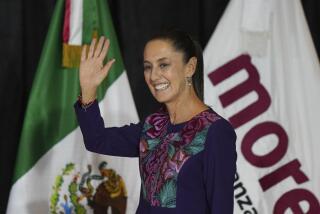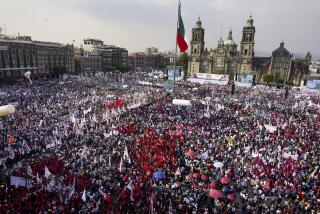Amid observer optimism, some citizens express fear over Nigeria presidential vote
- Share via
Reporting from Suleja, Nigeria — More than 70 million Nigerians are expected to go to the polls Saturday to choose a president. But Rashida Adaune will not be among them.
Her eyes dart away at the idea.
“Not safe,” the 28-year-old whispers.
Near her house, the local headquarters of the Independent National Electoral Commission is wrapped in yellow crime scene tape, and there’s a gaping hole in the wall where a bomb blew up a week ago, killing 13 people.
The presidential election will be far from perfect, as Suleja’s violence testifies. At least 39 people were killed in parliamentary elections a week ago, a dry run for the presidential vote, amid reports of hijacked or stolen ballot papers and names missing from the voter rolls.
But Western observers say last week’s vote marked a sharp improvement from the 2007 general elections, regarded as the worst in Nigeria’s history. That has raised hope that Saturday’s vote could be the first to reflect the will of a people more accustomed to manipulation, fraud and threats when going to the polls.
President Goodluck Jonathan, the ruling party candidate, who has held the post since the death of his predecessor in May, is facing a stout challenge by former military ruler Muhammadu Buhari.
Although analysts predict a victory for Jonathan, he must win at least 25% of the vote in two-thirds of the 36 states and the federal capital territory to avoid a runoff. And that could be a complicated task in a country where loyalties are often divided between the mostly Muslim north and mostly Christian south.
That analysts are even speculating about a runoff, however, marks progress.
“What we saw this time around was a system that generally worked and it appeared to meet the expectations of the Nigerians who participated,” said Dan Fisk, vice president of the International Republican Institute and part of its observer mission in Nigeria, referring to the April 9 parliamentary vote. “If you look at how Nigerians have responded, a large percentage of candidates and people have accepted the outcome of this election.”
Joe Clark, a former prime minister of Canada who is in the country with the National Democratic Institute observer mission, said Nigeria’s electoral commission, the INEC, was “far more committed to free and fair elections than INEC in 2007. We were very impressed by what we saw in the field on April 9. We will see tomorrow whether it continues, and I think everyone expects it will. I think the expectation is that this election will be appreciably better than 2007.”
Nigeria, Africa’s most populous country with more than 150 million people, was once an agricultural society but now has to import food. A major oil producer, it also must import refined fuel. Its schools, hospitals, roads and power infrastructure are decrepit and it faces chronic power problems. Unemployment and poverty are rife and corruption entrenched.
Like most Nigerians, Adaune is angered by poor governance. She ticks off a long “to do” list for the government on her fingers: electricity, education, water, security.
Go anywhere in the country, and you get a very similar list, a condemnation of the failure of the ruling People’s Democratic Party to deliver since the end of military rule in 1999.
Yet Adaune is pro-PDP. She would vote for Jonathan on Saturday if she were not so afraid.
Helen Brown, 28, who lives a stone’s throw from the site of the bomb blast in this central city, is an ardent Jonathan fan. But she’s not planning to vote either, for fear of an attack.
“The man is a good man. I just like him,” she says in one breath; then in the next: “We have to buy water. The tap doesn’t work. Daily we pay 200 naira for water, or 250 [$1.30 to $1.60]. Kerosene is 800 naira [about $5], and that will last you a week. The government schools, look at them, they don’t have good teachers.”
Her husband, a prison officer, earns $258 a month, and the family is “just managing.”
Despite calls for people to cast their vote according to who would make the best leader, ethnic and religious allegiances play big roles in Nigerian politics.
Jonathan is a Christian from what Nigerians call the South South, the Niger Delta region, one of the poorest and most disadvantaged corners of the country. Buhari, a northern Muslim, has a reputation as a clean politician and a disciplinarian, determined to crack down on one of Nigeria’s biggest problems: corruption.
Jonathan’s support is strong in the south, but weaker in Buhari’s stronghold, the north, one of the most populous areas, and in the southwest, where the Action Congress of Nigeria is strong. Its candidate, Nuhu Ribadu, is seen as an outsider in the presidential race; however, his party’s votes would be crucial if the presidential vote were to go to a runoff.
Buhari’s Congress for Progressive Change held talks with the ACN about forming a strong united opposition force capable of defeating the PDP, but the talks failed Wednesday. Under the deal, Ribadu would have stepped down as a candidate in Buhari’s favor.
Buhari wept at a news conference Wednesday after the talks collapsed, saying it was his third and last run for the presidency. He said later that he had been weeping for the fate of suffering Nigerians, many of whom he said sold their votes to the ruling party because they were so poor.
“I wept because in spite of the problems bedeviling the people, there are still those ready to sell their votes and end up in slavery together with their children and even their grandchildren,” he said in an interview with the BBC’s Hausa service.
More to Read
Sign up for Essential California
The most important California stories and recommendations in your inbox every morning.
You may occasionally receive promotional content from the Los Angeles Times.













